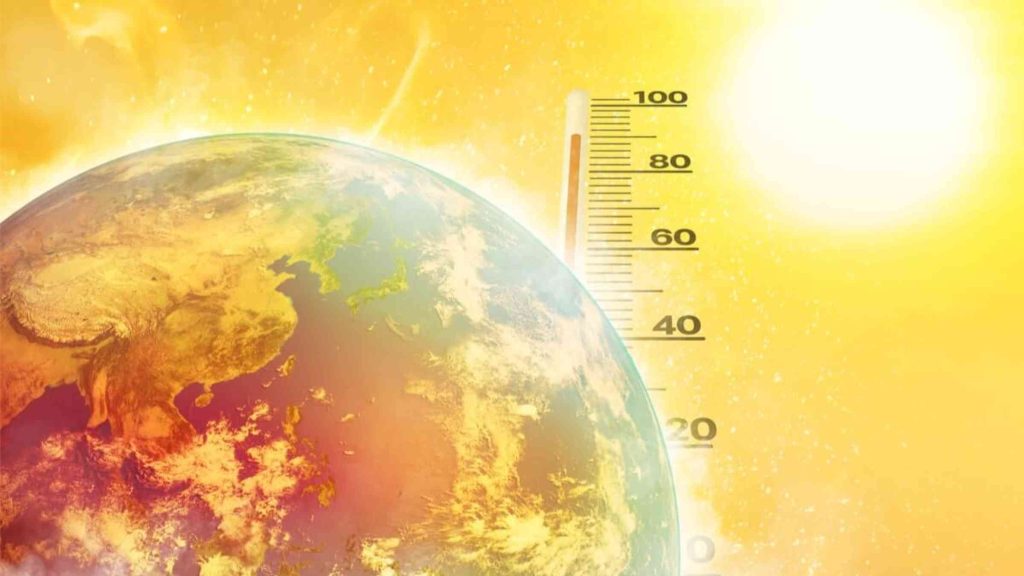
Countries around the world are suffering from extreme heat
Meteorologists attribute the current above-average temperatures in many parts of the world largely to global warming. While some regions are experiencing colder conditions, the majority are still facing well above-average temperatures. According to BBC Weather’s Chris Fawkes, these heat waves are “a consequence of climate change.”
The threat of heat: how high temperatures endanger lives and forests
Extreme heat can have deadly consequences. For instance, the 2003 heatwave in Europe resulted in 30,000 fatalities. Furthermore, prolonged exposure to high temperatures can heighten the risk of wildfires, which have already been observed in certain areas of California, USA.
Temperature extremes, such as heatwaves, are becoming more frequent and intense due to climate change. High temperatures can lead to a dangerous health condition known as heatstroke, which can be deadly, especially for vulnerable groups such as the elderly and children. Additionally, high temperatures can exacerbate respiratory and heart problems, as well as cause dehydration.
In addition to the threat to human health, heat can have serious consequences for forests and ecosystems. Increased temperature and dryness contribute to the occurrence of forest fires, which destroy vegetation, damage wildlife, and degrade soil quality. Forest fires can also endanger lives and property, as well as lead to serious ecological consequences such as worsened air quality and loss of biodiversity. To reduce the risk of heat-related issues, it is crucial to implement strategies to adapt to climate change. This includes enhancing cooling systems for better efficiency, refining heat warning mechanisms, and effectively managing forest fires. Reducing greenhouse gas emissions is crucial to mitigate temperature rise and decrease the likelihood of extreme weather events.
Climatologists are raising concerns about extreme heat
Climatologists worldwide are raising alarms about extreme temperatures that are becoming more frequent and severe. Such heat can have deadly consequences. The situation is worsening not only in Europe but also in other parts of the world. North America, South and East Asia, and Southeast Europe are all experiencing extreme temperatures. In Mexico and southern.Recently, Texas faced the initial named storm of the North Atlantic hurricane season, resulting in “life-threatening” floods and mudslides.
Experts warn that if urgent measures to combat climate change are not taken, the consequences will be even more catastrophic. Scientists emphasize the need to increase investments in green technologies, improve land resource management, and support ecological initiatives. For instance, the UK is developing plans to protect 30% of its land and sea areas by 2030, create new national forests, and increase the number of critical habitats.
The approaching hot seasons require not only immediate actions but also a long-term strategy. It is essential for all countries to collaborate in reducing greenhouse gas emissions and adapting to new climate conditions. Only through joint efforts can we lessen the impact of extreme temperatures and safeguard our planet for future generations.

North America
Currently, over 70 million Americans, roughly one in five, are under excessive heat warnings due to a high-pressure system creating a “heat dome,” which traps warm air beneath it.Warnings are also in effect in four Canadian provinces: New Brunswick, Nova Scotia, Ontario, and Quebec.
US meteorologists are predicting temperatures to surpass 38°C (100°F) in the latter half of the week.
While many parts of the continent are grappling with extreme heat, Mexico and southern Texas have felt the effects of the first named storm of the North Atlantic hurricane season. In Mexico, three individuals have lost their lives along the coast, while the US National Hurricane Center has issued alerts regarding “life-threatening” flooding and mudslides in northeastern Mexico and southern Texas.
India
Northern India is currently experiencing a prolonged heatwave, with temperatures reaching 44 -45C (113F). This extended period of hot weather has resulted in record-breaking power consumption as people in India increase their use of fans and air conditioning units, causing power outages in Delhi on Monday. The heatwave has also impacted water supplies in the city.
Dozens of people have succumbed since March, with 50 deaths reported over a three-day span earlier this month in the states of Uttar Pradesh and Odisha.
This year, India’s summers have been particularly severe, characterized by longer, more intense, and more frequent heat waves, although summers in the region are typically hot and humid.

Saudi Arabia
The extreme heat in Saudi Arabia has been linked to the deaths of several Muslim pilgrims in Mecca. According to reports from the AFP news agency, which the BBC has not independently confirmed, over 1,000 individuals have died during the annual Hajj pilgrimage.
While fatalities during the Hajj have occurred previously due to overcrowding and fires, the Saudi National Meteorological Center reported a peak temperature of 52°C (125°F) earlier this week at the Grand Mosque in Mecca, as per AFP reports.
Saudi authorities are distributing water to pilgrims and advising individuals to avoid being outdoors during the hottest hours of the day, from 10:00 to 16:00.
Greece
Greece has reported several deaths during its earliest recorded heatwave. Among the casualties is British TV and radio presenter Michael Mosley, along with several tourists.
Greek authorities have recently closed the Acropolis in Athens and shut schools due to the ongoing heatwave. Firefighters are also working to contain a wildfire on the island of Lesvos. While Greece typically experiences high temperatures in the summer, meteorologists attribute the current heatwave to winds from North Africa.